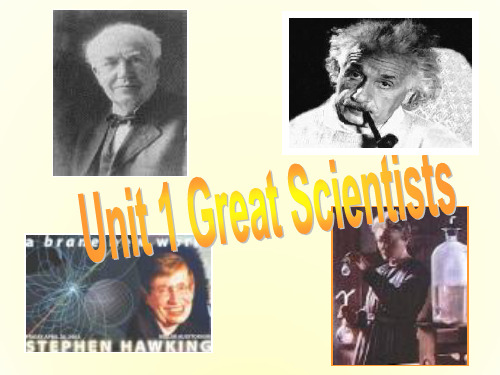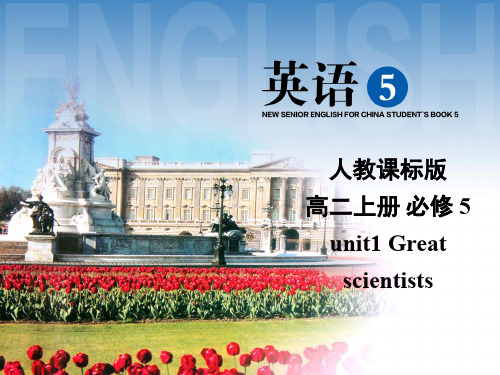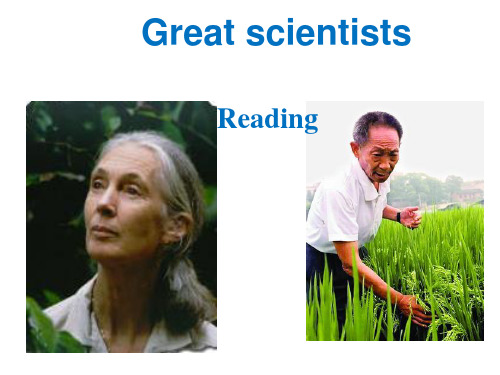【2014年备考】2013版高中英语全程复习课件:必修5 Unit 1 Great scientists(人教版)
【人教版英语】2014年高考最新复习课件---必修五

返回目录
第21讲
Unit 1
Great scientists
基 础 梳 理
Ⅱ.短语检测 1.提出 2.得出结 3.暴露在 4.把……和……联系起来 5.此外 6.对……严格的 7.有意义;有道理 8.导致;通向
• • • • • • •
第21讲
佳 作 晨 读
Unit 1
Great scientists
—— 精 彩 美 文 —— Hi_Susan, We're_throwing_a_surprise_party_for_Xiaoming's_ birthday. We'd like to invite you to the party. We want to give him a surprise, so please keep quiet about it. We'll gather at the Students' Club at 8 pm this Friday, after the evening classes. And it's going to last about an hour. We each will prepare a little present. When he comes, we'll light the candles and sing “Happy Birthday” together for him.
返回目录
第21讲
佳 作 晨 读
Unit 1
Great scientists
—— 名 师 点 睛 —— 1.行文逻辑:说明原因→晚会时间、地点和内容→ 表达愿望。较好地使用了连接词,如:so,And,Then等 。 2.词汇短语:运用了较高级的词汇和短语。如: throw a surprise party,keep quiet about, gather, last, prepare, have a good time等。
人教版高中英语必修五高二英语 Unit 1 Great Scientists(练习课件) (共54张PPT)

• 14.私下地;秘密地 • 14. privately -privacy
• 15.分析
• 15. analyse-
• 16.战胜
analysis[ə'nælɪsɪs]
• 17.剧烈的;严厉的 • 16. defeat (the enemy)
• 18.肯定的;积极地 • 17. severe-severely
• 10. 吸收,专注于
• 8. expose to
• 11. 把……捐给或贡献给……• 9. be to blame
• 12. 治好,矫正(某人)
• 10. absorb into • 11. contribute to
• 12. cure sb. of
• 短语
• •
13.致命的疾病 • 14.全神贯注于某事•
• 19. 拒绝,抛弃 • 18. positive-negative
• 19. reject-rejection
• 20.内科医生 • 20. physician—physical
• 21.挑战 • 22.受害者
• 21. challenge meet/face/accept/ • 22. victim take up a challenge
• 27. certainty—certain—
certainly
1.put forward 提出,提议,建议 提出计划/建议 put forward ____a_p_l_a_n_/_a_s_u_g_g_e_s_t_io_n__
We’ve put the wedding forward by one week. 将…提前
约翰.斯诺曾经是一位著名的医生---他的确太富盛名了,因而成为照料维 多利亚女王的私人医生.
高中英语Unit1 Great Scientists-period1课件 新课标 人教版 必修5

Marie Curie (1867-1934) (Polish and French, won two Nobel Prizes)
6.Who invented the way of giving electricity to everybody in large cities?
Thomas Edison (1847-1931) an American inventor
Archimedes (287-212 BC) an ancient Greek mathematician & physicist
2.Who wrote a book explaining how animals and plants developed as the environment changed?
4.Who used peas to show how physical characteristics are passed from parents to their children?
Gregor Mendel (1822-1884) Czech (捷克人)
5.Who discovered radium?
Pre-reading
Miniature Miner's Safety Lamp
9.Who invented the earliest instrument to tell people where earthquakes happened?
Zhang Heng
(78-139) Chinese, invented seismograph
Mona Lisa
Last Supper
Leonardo da Vinci (1452-1519) Italian artist
人教版高中英语必修五课件:Unit 1 Great scientists Using languag

(3) What had the astronomers noticed in the sky? (Para 2)
They had noticed that some planets in the sky seemed to stop, move backward and then go forward in a loop(圈, 环). Others appeared brighter at times and less bright at others.
——Heliocentric Theory 日心说 [hi:liəu'sentrik]
7
born: in Poland in 1473
Nicolaus Copernicus
died : in 1543
occupation: astronomer
He lived at a time when ideas about science and mathematics
15
(5) How did he explain changes in the movement of the planets and in the brightness of the stars? When did he publish his idea? (Para 4)
He placed a fixed sun at the centre of the solar system with the planets going round it and only the moon still going round the earth. He also suggested that the earth was spinning as it went round it and this explain changes in the movement of the planets and in the brightness of the stars.
人教新课标高中英语必修五 unit1 Great scientists reading 课件(共22张PPT)

3. When cholera broke out in 1854, it spread quickly through poor neighbourhoods. (T)
4. The people who drank beer instead of water did not catch cholera. (T)
6. Find supporting evidence.
7. Draw a conclusion.
•A woman and her daughter died after drinking the water from Broad Street pump.
•He announced that polluted water carried the virus.
5. The water companies were asked to stop supplying polluted water to people. (T)
III. Match the stages of scientific
research with what John Snow did to
About John Snow
He was a famous __d_o_c_t_o_r_ and
Queen Victoria's personal physician. He made up his mind to solve the
problem of _c_h_o_l_e_r_a_.
Two
Theory 1: Cholera was spread by
Unit 1 Great Scientists Reading 课件-高中英语人教新课标必修五

People absorbed it with their meals.
2023/1/25
(3) aiming to kill or destroy 意在杀死的; 不共戴天的: a deadly enemy 不共戴天的敌人 2)deadly adv. (1) very 极度; 非常; 十分 deadly serious 十分认真 (2) like death 死一般地
John Snow was a well-known _d_o_c_to_r_ in London in the _1_9_th__ century. He wanted to find the _c_a_u_s_e_ of cholera in order to _d_e_fe_a_t_ it. In 1854 when a cholera _b_r_o_k_e_ out, he began to gather information.
He _m__a_r_k_e_d__ on a map where all the dead people had lived and he found that many people who had drunk the dirty water from the _p_u_m__p_ died. So he decided that the polluted water carried cholera. He suggested that the _s_o_u_r_ce__ of all water supply be _e_x_a_m__in_e_d__ and new methods of _d_e_a_l_in__g_ with polluted water be found. Finally, “King Cholera” was defeated.
人教版高中英语必修5unit 1 great scientists writing课件(共18张ppt)
较高级别的词汇、句型或结构。
2020/7/22
8
写说服性信函常用的表达 引出话题: I am writing to try to persuade you ... I would like to suggest that ... 阐述理由: Here are the reasons. I hope you ... for several reasons. The reason for ... is that ...
2020/7/22
4
【写作指导】 我们可以通过以下三个部分来进行写作: 第一部分:引入。写信人首先需要简要说明 写信的主要目的。如果需要的话,也可以大 致作个自我介绍。 第二部分:阐述。这是说服性信函的主体和 核心部分。写信人需要在这个部分有条理地 列出自己的理由。
2020/7/22
5
理由要力求客观、真实、有说服力,要重点 突出、层次分明。同时,要注意适当提高语 言的力度,发挥语言的功力,以更好地展现 自己的立场。阐述部分决定了说服性信函的 成败,需要写信人精心策划、布局,以达到 最佳效果。2020/7/22 Nhomakorabea12
注意:1. 词数100左右; 2. 可以适当增加细节,以使行文连贯;3. 信 件的开头和结尾已给出,但不计入总词数。
Dear Mr. Brown, I am writing to you on behalf of the students in our school. _____________
2020/7/22
1
2020/7/22
2
To learn to write a persuasive writing and a descriptive writing.
高中英语人教版必修5课件:(Unit 1 Great scientists Period 1)
Unit 1Great scientistsBrief Statements Based on This UnitThis unit centers on Great scientists, including some scientists both at home and abroad like John Snow and Copernicus.The students should be encouraged to practise talking about these scientists.The whole unit can be divided into seven parts: warming up, reading, listening and speaking,In warming up, there is a quiz for the students to do, which will arouse the students’ intere st in knowing about the famous scientists and help the students to know science is very important in our daily life.Group discussion and brainstorming will be used in this period to help the students to communicate with each other using their previous knowledge.In the reading passage, the students will learn about John Snow, who defeats“King Cholera”, and get a general idea about how to examine a new scientific idea.This will help the students to form their own attitude towards science.In learning about language, the students are encouraged to learn the following words and expre ssions: engine, characteristic, radium, theory, scientific, examine, conclude, analyze repeat, defeat, attend, expose, cure, control, absorb, severe, valuable, blame, immediately, handle, announce, instruct, virus, construction, contribute, positive, movement, backward, complete, enthusiastic, spin, reject, view, steam engine, put forward, draw a conclusion, in addition, link...to..., be strict with, lead to, make sense, point of view.While practising using the language, the students will learn about Copernicus’ RevolutionaryIn listening and speaking, more chances will be given to the students to learn about other scientists and their spirit.The students are encouraged to make up their mind to make contributions to science.The students will be asked to write a letter to Copernicus on the basis of the understanding of the text.The letters are sure to be fuAssessment will help the students to look back what they have learned and focus on the difficult and important points.Period 1Period 2Period 3Period 4Period 6Period 7Knowledge aims:Key words in this unit: engine, characteristic, radium, theory, scientific, examine, conclude, analyze, repeat, defeat, attend, expose, cure, control, absorb, severe, valuable, blame, immediately, handle, announce, instruct, virus, construction, contribute, positive, movement, backward,Key phrases in this unit: put forward, know about, look into, in addition, prevent sth.from doing, lead to, make sense, punish sb.for, suggest doing sth.steam engine, draw a conclusion, link...to..., be strict with, lead to, point of view.Key sentence patterns:1 But he became inspired when he thought about helping ordinary people exposed to cholera.3 Only if you put the sun there did the movements of the other planets in the sky make sense.Grammar in this unit:Ability aims:4.To leaEmotion aims:and how science helps to improve our society and change our life.Meanwhile, inspire th e students to learn from the scientists and form their positive attitude towards science.Period 1Welcome to the UnitThe General Idea of This PeriodThe unit centers on“great scientists”.This is the first period of this unit.During this period, the students should be encouraged to give their previous knowledge of some of the famous scientists, participate in the activities in class and try to get more information from the discussion.They will take part in different forms of activities, including pair work, group work, competition, andWords and expressions in this unit will help the students to talk about the topic“great scientists”.So at the beginning of this period, the teacher should spend s ome time training the students to read them and help the students pronounce them correctly.The students are encouraged to learn the new words in groups by themselves, using dictionaries and other reference books.Then more time should be given to the students to get familiar with the words and stly, several sentences will be given to the students to help them to know how to use some of the phrases.This unit is about“great scientists”, so from the very beginning, the teacher can students talk about their dreams in the future.Then the teacher can let the students brainstorm something about great scientists.The students are free to say anything that they know.The students will be quite interested in this topic.This activity gives the students a chance to express their feelings about their favorite scientist.At the same time, this activity can stir the students’ enthusiasm in science.Then the teacher can have the students match the famous scientists with their discoveries,inventions or theories, making sure that they have some common sense about some world-famous scientists.and let other students guess who he or she is talking about.In this way, the students should learn toAfter that, the students will feel comfortable to do the quiz in the text.The students should be encouraged to give more information about these ten scientMeanwhile, the students’ interest in scientists and science should be cultivated.So two topicThe post-class activities are designed to arouse the students’ interest in science a nd encourage them to“DIY—do it yourself” in their daily life if they have some doubt in some areas.Teaching Important PointsHave the students discuss great scientists.Understand and learn the following words and expressions: engine, characteristic, radium, theory, scientific, examine, conclude, analyse, repeat, defeat, attend, expose, cure, control, absorb, severe, valuable, b lame, immediately, handle, announce, instruct, virus, construction, contribute, positive, movement, backward, complete, enthusiastic, spin, reject, view, steam engine, put forward, draw a conclusion, in addition, link...to..., be strict with, lead to, make sense, point ofTeaching DifficultiesWhat can weTeaching AidsCAI equipment with a Multi-Three Dimensional Teaching AimsKnowledge AimsLearn sKnow about the outstanding discoveries, inventions and theories from some well-known scientists.Ability AimsDevelop the students’ abilEmotional AimsHelp the students to form the good habit in learning and encourage the students to take part inHelp the students to realize that it is scientific spirit that makes those scientists successful.Teaching ProcedureStep 1 GreetingTeacher: HStep 2 Lead inT: I’m very glad to see you all here.After a long holiday, all of you look energetic and happy.I hope that we will work hard together happily all through the year.I do believe that a bright future is waiting for you.We are sure to realize our dreams in the near future.By the way, I’d like to know what you would like to be in the future.Let me share your dreams.Anyone who gives your idea will get a star for your group.Ready?Go!S: I admire Yang Liw ei very much, who is a great honour to our motherland.I’d like to be an astronaut like him.T: Yeah, the spacecraft, Shenzhou V, orbited the earth 14 times in 21 hours, making China the third country to have successfully sent an astronaut into space.I hope you will realize your dream.S: I want to be a doctor.I hope I’ll be an outstanding one and be expert in finding cures forT: That’s a good idea.There are so many patients with cancers in the world, who are suffering a lot.ThaS: I want to be an English teacher like you.For one thing, I like English very much; for another, you are not only strict with us but also patient with us.You are just our friends and maybeT: I’m really glad to hear that.It’s my great honor to be your friends and I like my job very much.S: I’d like to be an expert in environment.You see, with the development of industry, our globe is seriously polluted.Dirty water, polluted air, and loud noise make our living conditionsT: Yes, someone predicted that the last drop of water in t he world would be the tear of human being’s.I think all of us should pay attention to our environment, and make our contributions toS: I’m so interested in physics.And I have read Stephen Hawking’s A Brief History ofwill go hand in hand with the development of science.T: Yeah, I can’t agree with you more.Science plays an important part in the development of our society.There are so many examples in the history of human beings.Ss: ...T: I’m so glad to share your dreams.Your ambition and carefu l thoughts really leave a good and amazing impression on me.I like them.In this unit, you will learn something about“Great scientists”.Maybe you will know what you need in your efforts to realize your dreams after we talk about some world-famous scientists.Before we come to“Warming up”, I’d like you to come toStep 3 Word puzzles(Let the students read the words and expressions together.Help them pronounce the new words and expressions ter give them some time to practise reading and rememberT: Here are some definitions of some of the words from this unit.Please work in pairs andWords Definitions or explanationsA.examineB.repeatC.theoryD.immediatelypleteF.valuableG.announceH.control e or briI.positiveJ.conclude 10.quite certain or sureT: Now, let’s check the answers.A—4, B—2, C—1, D—3, E—6, F—5, G—7, H—9, I—10, J—8. You have done a good job.I will give you some more minutes to go over all the words and1.“All roads lead to2.This sentence doesn’t make any sense3.Our English teacher is not only strict with4.He is good-looking, apart from5.It is announced that the spacecraft, Shenzhou Ⅵ6.It is not Tom but you who are to blame7.In 1995, the Chinese government put forward a plan for“rejuvenating the nation by relying8.Have you drawn any conclusion after you read this passage?T: Well done.So much for the learning of the new words and expressionsStep 4 BrainstormingT: Now let’s come to the title of this unit Great scientists.When we talk about greatS1: Madame Curie, who got two Nobel Prizes, one for physics and the other for chemistry, isS2sayings“Genius is one percent inspiration and ninety-nine percent perspira tion.”S3: Yes, we lead a better life now with the help of science.Without Edison, maybe now we areS4: I also think of one of the quotes from Albert Einstein, “Imaginatio n is more important than knowledge.”S5: All the scientists are devoted to the career that they choose, and they set good examples toS6: Take all the scientists for example, if we want to be successful in the future, we should not only learn something from our textbooks, but also take part in social practice and get close toS7: I like plants very much.I just think of the two key scientists in the field of botany, Carl Linnaeus and Joseph Banks.The former one laid the foundation for the classification of plants, while the latter one also made great contributions to the development and direction of botany.Ss: ...T: I’m glad to see that you have a great deal of previous knowledge of famous scientists inthe world.Step 5 Previous knowledgeT: Now let’s match some of the great scientists with their famous discoveries, inventions orFamous scientists Discoveries/A.Isaac Newton 1.Evolution (进化论B.Charles Darwin 2.Discovery of Radium(镭)C.Madame CurieD.Albert EinsteinE.Thomas Alva EdisonF.Nicolaus CopernicusG.Stephen HawkingH.Zhang Heng(Check the answers with all the students: A—3, B—1, C—2, D—5, E—4, F—8, G—7, H—6.)T: Since you have a better understanding of some of the great scientists, l et’s play a game. Please work in groups and describe one of the great scientists, and then let other students guessGroup 1: In the eighteenth century, there lived a great scientist who conducted a number of experiments in which he showed what electricity is.Once he did a famous kite experiment on aS: Benjamin Franklin.Group 2: It is said that this English gentleman was sitting in his garden one day when suddenly he was hit by a falling apple.The story is probably not true, but this man did mention that he got one of his best-known ideas while watching apples fall from a tree.His name makes youd hedrew up a system of how objects move.His laws for motion are still used in physics today, at leastGroup 3:Food is what sets this great mind on fire.Rice, to be exact.This great mind has spent most of his life looking for ways to help farmers grow more rice so that all of us will have enough food to eat.He is known as the father of modern rice, but because of his long friendship with all the farmers in China, he wouldGroup 4: He was born on 8 January 1942 in Oxford, England.He has worked on the basic laws which govern the universe.He showed that Einstein’s General Theory of Rel ativity implied space and time would have a beginning in the Big Bang and an end in black holes.He has three popular books published: his best seller A Brief History of Time, Black Holes and Baby UniversesS: Stephen HawkinSs: ...Step 6 QuizT: You have already known some information about some of the great scientists.Now let’s doQuiz Questions1.Which scientist discovered that objects in water are lifted up by a force that helps them float?2.Who wrote a book explaining how animal s and plants developed as the environment changed?4.Who used peas to show how physical characteristics are passed form parents to theirCheck the answ1.Archimedes2.Charles Darwin3.James Watt7.Leonardo davinciHawkingT: Please work in groups and have a discussion to find as much information as possible about(The teacher had better join in the discussion and give them some guidance whenever necessary.After the discussion, ask some students to give a short report about what the group haveStep 7 PracticeT: Today we have learned a lot about great scientists in the world.We can learn from them to live our dreams.And we teachers are too willing to help you.In your opinion, what should ourS: Our school should give the students more chances to take part in social practiceS: Our teachers should help the students use their imaginationsS: We students should solve the problems on our own.(Ask more students to give their opinions.The teacher should encourage them, join them,Step 8 Discussion (Group Competition)T: Your ideas are so wonderful and amazing.I admire them very much.Now let’s come to our topic.Topic 2: Wha(Give the students several minutes to have a discussion.Then let them have a group competition.)Step 9 Summing upT: In this period, we have talked a lot about great scientists.You have a lot of previous knowledge and you are full of imagination and creativity.Those scientists set good examples tous.And I think all of us are happy about learning more of them.After class, it’s better to read some books about them and you can surf the Internet to get mor e information.And I’d like you to makeThe Design of the Writing on the BlackboardU nit 1Great scientistsPeriod 1Welcome to the UnitBrainstormingResearch and ActivitiesDIY1.Cover a glass of water with a piece of thick paper.Put one hand on the paper and turn the2.Fill one glass with fresh water and another glass with salt water. Put an ice cube in each glass.What happens?Why?3.Find out as many famous sayings from those scientists as possible.Reference for Teaching1.Charles Darwin was born in Shrewsbury(shropshire) to a moderately wealthy family with a strong intellectual heritage.His grandfather, Erasmus Darwin, was a physician, poet and biologist who laid some of the groundwork for the grandson’s revolutionary ideas.Charles attended Christ’s College at Cambridge with initial thoughts of entering the clergy, but soon took up studies in biology, zoology and geology.From 1831 to 1836, he served as a naturalist aboard the HMS Beagle on its scientific mission to South America and the Pacific.Back in England, he published a series of scientific treatises which established his reputation as one of the prominent thinkers of his day.From 1842 onwards, he lived on a country estate in Kent and pursued his studies among itsBy 1844, he had written the initial draft of his groundbreaking treatise on evolution and natural selection.However, he left this work unpublished for several years, preferring to refine and elaborate its core ideas.In 1858, he read a forthcoming paper by a fellow scientist Alfred Russell Wallace whose thesis closely paralleled Darwin’s own unpublished ideas, an event which pushed Darwin to go public wit h his own research.Both Wallace’s and Darwin’s papers were presented to the Linnean Society in a famous July, 1858 meeting. Darwin published The Origin of Species by Means of Natural Selection in 1859, sparking decades of contentious debate which ultimately led to the universal scientific recognition of Darwin’s thesis.In later years, he developed his ideas further in monographs on different types of plant and animal life.Notes:Shrewsbury: 什鲁斯伯里[英国英格兰西部城市physician: 内科医生(注意区分physicist, 物理学家revolutionary: 创新的HMS: (英国)皇家海军舰船treatises: 论文2.Stephen William Hawking was born on 8 January 1942 (300 years after the death of Galileo) in Oxford, England.His parents’ house was in north London, but during the Second World War Oxford was considered a safer place to have babies.When he was eight, his family moved to St Albans, a town about 20 miles north of London.At eleven Stephen went to St Albans School, and then on to University College, Oxford, his father’s old college. Stephen wanted to do Mathematics, although his father would have preferred medicine.Mathematics was not available at University College, so he did Physics instead.After three years and not very much work he was awarded a first class honours degree in Natural Science.Stephen then went on to Cambridge to do research in Cosmology, there being no-one working in that area in Oxford at the time.His supervisor was Denis Sciama, although he had hoped to get Fred Hoyle who was working in Cambridge.After gaining his Ph.D.he became first a Research Fellow, and later on a Professorial Fellow at Gonville and Caius College.After leaving the Institute of Astronomy in 1973 Stephen came to the Department of Applied Mathematics and Theoretical Physics, and since 1979 has held the post of Lucasian Professor of Mathematics.The chair was founded in 1663 with money left in the will of the Reverend Henry Lucas, who had been the Member of Parliament for the University.It was first held by Isaac Barrow, and then in 1663 by Isaac Newton.Stephen Hawking has worked on the basic laws which govern the universe.With Roger Penrose he showed that Einstein’s General Theory of Relativity implied space and time would have a beginning in the Big Bang and an end in black holes.These results indicated it was necessary to unify General Relativity with Quantum Theory, the other great Scientific development of the first half of the 20th Century.One consequence of such a unification that he discovered was that black holes should not be completely black, but should emit radiation and eventually evaporate and disappear.Another conjecture is that the universe has no edge or boundary in imaginary time.This would imply that the way the universe began was completelyHis many publications include The Large Scale Structure of Spacetime with G F R Ellis, General Relativity: An Einstein Centenary Survey, with W Israel, and 300 Years of Gravity, with W Israel.Stephen Hawking has two popular books published: his best seller A Brief History ofProfessor Hawking has twelve honorary degrees, was awarded the CBE in 1982, and was made a Companion of Honour in 1989.He is the recipient of many awards, medals and prizes andStephen Hawking continues to combine family life (he has three children and one grandchild), and his research into theoretical physics together with an extensive programme of travel and public lectures.3.Humphry Davy, a woodcarver’s son, was born in Penzance in 1778. After being educated in Truro, Davy was apprenticed to a Penzance surgeon.In 1797 he took up chemistry and was taken on by Thomas Beddoes, as an assistant at his Medical Pneumatic Institution in Bristol.Here he experimented with various new gases and discovered the anesthetic effect of laughing gas (nitrousoxide).Davy published details of his research in his book Researches, Chemical and Philosophical (1799).This led to Davy being appointed as a lecturer at the Royal Institution.He was a talentedIn 1806 Davy published On Some Chemical Agencies of Electricity. The following year he discovered that the alkalis and alkaline earths are compound substances formed by oxygen united with metallic bases.He also used electrolysis to discover new metals such as potassium, sodium,Davy was now considered to be Britain’s l eading scientist and in 1812 was knighted by Georg e Ⅲ.With his assistant, Michael Faraday, Davy travelled abroad investigating his theory ofIn 1815 Humphry Davy invented a safety lamp for use in gassy coalmines, allowing deep coal seams to be mined despite the presence of firedamp (methane).This led to some controversy as George Stephenson, working in a colliery near Newcastle, also produced a safety lamp thatOn e of Davy’s most important contributions to history was that he encourage manufacturers to take a scientific approach to production.His discoveries in chemistry helped to improve several industries including agriculture, mining and tanning.Sir Humphry Davy died in 1829.4.Leonardo da Vinci(b.1452, Vinci, Republic of Florence [now in Italy]—d.May 2, 1519, Cloux, Fr.), Italian painter, draftsman, sculptor, architect, and engineer whose genius, perhaps more than that of any other figure, epitomized the Renaissance humanist ideal.His Last Suppe (1495-1497) and Mona Lisa (1503-1506) are among the most widely popular and influential paintings of the Renaissance.His notebooks reveal a spirit of scientific inquiry and a mechanical inventiveness that were centuries a5.Madam Curie is a French professor of physics.She was born in Poland in 1867.In 1891 she went to study in Paris University because at that time women were not admitted to universities in Poland.When she was studying in Paris, she lived a poor life, but she worked very hard.In 1895 she married Pierre Curie, and then they worked together on the research into radioactive matter.They discovered two kinds of radioactive matter—polonium and radium.In 1904 she and her husband were given the Nobel Prize for physics.In 1906 Pierre died, but Marie went on working.She received a second Nobel Prize for Chemistry in 1911.So she became the first scientist in the world to win two Nobel Prizes.6.James Watt: British engineer and inventor who made fundamental improvements in the steam engine, resulting in the modern, high-7.Gregor Mendel was an Austrian botanist and founder of the science of genetics.Through years of experiments with plants, chiefly garden peas, he discovered the principle of the8.Archimedes: Greek mathematician, engineer, and physicist.Among the most important intellectual figures of antiquity, he discovered formulas for the area and volume of various geometric figures, applied geometry to hydrostatics and mechanics, devised numerous ingenious mechanisms, such as the Archimedean screw, and discovered the principle of buoyancy.9.Michael Faraday (September 22, 1791—August 25, 1867) was a British scientist(a physicist and chemist) who contributed significantly to the fields of electromagnetism and electrochemistry. He also invented the earliest form of the device that was to become the Bunsenburner, which is used almostMichael Faraday was one of the great scientists in history.Some historians of science refer to him as the greatest experimentalist in the history of science.It was largely due to his efforts that electricity became a viable technology.The SI unit of capacitance, the farad(symbol F) is named after him.11。
高中英语人教版必修五Unit1_Great_Scientists[全单元]ppt课件
汉弗里·戴维 爵士
Thomas Edison
• AGmeenriicuasni(s1o8n4e7-p1e9r3c1e)nt inspiration and ninety-nine percent perspiration.
天才就是百分之九十九的汗水加上 百分之一的灵感。
The Inventions of Thomas Edison
A Brief History of Time
John Snow Defeats “King Cholera”
Pre-reading: Make a prediction about what this text will be about according to the title.
John Snow
10.Who put forward a theory about black holes?
Zhang Heng Stephen Hawking
Thomas Edison
['tɒməs] ['edɪsn]
Leonardo da Vinci
[,liə'nɑrdo]
['vinsi]
Humphry Davy
evidence 7. Draw a conclusion
Careful Reading
---------What causes cholera?
--------Which theory is correct?
--------Gather information when another outbreak hit London in 1854
7. Who was the painter that studied dead bodies to improve his painting of people?
高中英语 Unit 1 Great scientists Reading 课件 新人教必修5
He graduated M.D. of the University of London on 20 Dec. 1844, and in 1850 he was admitted a licentiate of the Royal College of Physicians.
1836 37 38 39 40 41 42 43 44 1845
He is …Gregor Mendel
Who is he?
Who discovered radium?
He is …Marie Curie
Who is he?
Who invented the way of giving electricity to everybody in large cities?
He is … Stephen Hawking
Lead-in
Supply the following words with detail. John Snow Cholera
John Snow (1813-1858) York
London
John Snow was born in York on March 15th, 1813, the oldest of nine children.
Cholera can be mild or even without symptoms, a severe case can lead to death without immediate treatment. The diarrhea and vomiting brought on by the infection quickly leaves the body without enough fluid. The following dehydration(脱水) and shock can kill a person within hours.
